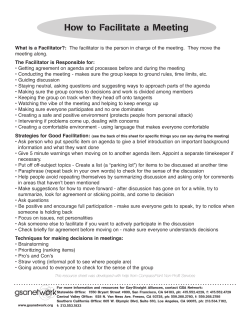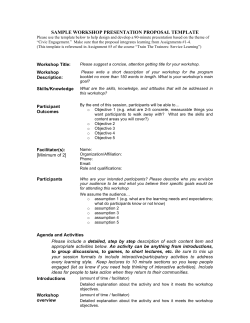
COURSE OVERVIEW - Dalhousie University
GLOBAL HEALTH CERTIFICATE (GHC 102): HEALTH SYSTEMS IN A GLOBAL CONTEXT WINTER 2015 COURSE OVERVIEW This certificate course will include a brief overview and presentation by invited experts speakers from a range of global health disciplines. These presentations are followed by interactive participatory discussions (in class and online) using a problem based learning approach with learners, drawing on their reading, experiences and interest to broaden the understanding of the whole group. Learners are expected to have reviewed pre-‐reading material in advance and come prepared to engage in discussion. The pre-‐readings will be drawn from a variety of sources and there is no single text on which instructions or assignments will be based. The course is an overview of various aspects of health systems within a global context, rather than in-‐depth coverage of a single topic and it is meant to help learners develop a variety of perspectives through which to view and analyze other challenges in health. Date: Jan 6 – Mar 31, 2015 (12 Sessions) Time: 5:30pm – 7:30pm Day: Tuesday’s Locations: Halifax and Saint John (DMNB) (Other off-‐site location will be considered on a case-‐ by-‐case basis) Course Material/Discussion Board Available -‐ https://dalhousie.blackboard.com Main Contacts Said Msabaha Course Coordinator, GHO Email: saidmsabaha@dal.ca Tel: 902.494.1574 Shawna O’Hearn Director, GHO Shawna.ohearn@dal.ca Tel: 902.494.1517 Course Planning Committee • Daniel Boudreau, MD, CCFP (EM) • Jan Hatcher Robert, MSc • Michael Fleming, BSc., MD, CCFP, FCFP • Shawna O’Hearn MA, MSc (OT) • Said Msabaha, MA • Tim Holland, MD, CCFP Global Health Office 241-5849 University Avenue Dalhousie University Tel: 902.494.1965 Fax: 902.494.2799 Email: gho@dal.ca | WEBSITE: dal.ca/globalhealth REGISTRATION DEADLINE: DECEMBER 1st, 2014 Course/Session Fee: $100 (LIMITED SEATS AVAILABLE) Learning Objectives By the end of this certificate course, learners will be expected to be able to: • Understand and apply a health systems framework in a global health and health systems context • To appreciate the myriad of international, national and local factors. For example; funding governance that influence health in a global context • Describe the broad patterns and determinants of diseases in the contemporary world, including infectious and chronic diseases, and the trends in these conditions • To understand and apply a health systems perspective to specific health problems, for example; HIV and TB • Understand human rights initiatives and their relationship to global health and gender • Describe the evolution of primary health care, universal health coverage and integrated services/program delivery for vulnerable populations Problem Based Learning In order to address these learning objectives, this certificate course will use a problem based learning approach. This means that there will not be a standard long and formal lecture but rather, students will be asked to review articles and will be expected to present a question from the readings at the beginning of each session. One of the course coordinators and/or invited expert speaker will be responsible for selecting articles and defining the objectives for the session; the questions that will be answered; and the key expectations for the session. One of the course coordinators and/or invited expert speaker will give a short overview of the key issues for the session. GLOBAL HEALTH CERTIFICATE (GHC 102): HEALTH SYSTEMS IN A GLOBAL CONTEXT WINTER 2015 Session Session 1: Introduction to Course Health Systems Strengthening Framework (JAN 6th, 2015) Facilitator: Jan Hatcher Roberts Session 2: Global Health Governance (Jan 13th, 2015) Facilitator: Jan Hatcher Roberts Session 3: Infectious Diseases in Developing Countries (January 20th, 2015) Facilitator: Dr. Wally Schlech Session 4: Global Health Research (Jan 27th, 2015) Facilitators: Drs. Bob Bortolussi & Noni Macdonald Session 5: Cultural Competency in Health (February 3rd, 2015) Facilitator: Mohamed Yaffa Session 6: Equity & Global Health (February 10th, 2015) Facilitator: Dr. Bob Huish Session 7: Global Health at home – Refugee Health (February 17th, 2015) Facilitator: Dr. Tim Holland and Gillian Zubizarreta Session 8: Environment and Health (February 24th, 2015) Facilitator: Mikiko Terashima Session Objectives This module will provide participants with a basic understanding of the social, economic and political factors that shape the health of populations. The first session of this module will be offered during the introductory block of the course and will explore various perspectives on the nature of global health and introduce principles, goals and methods of global health practices. We will review basic metrics and frameworks for analysis and resolutions of global health issues during a discussion of changing global demographics. The aim of the session is to introduce students to key issues, actors, institutions, mechanisms and instruments of Global Health Governance (GHG) including the negotiation processes that shape and manage governance for health. This module will provide an intro to clinical and public health aspects of infectious diseases, including approaches to their diagnosis, management and control. The focus will primarily be on three specific pathogens (HIV/AIDS, malaria and tuberculosis) and two infectious syndromes (diarrheal and respiratory tract infections) of major global health importance. Session will combine didactic overview of important concepts, small group interactive activities on emerging, challenges and controversies in global infectious diseases. This module will address the logistical, material and ethical issues involved in planning and executing scientifically and culturally sound research. Participants will also be introduced to methods of funding their research and strategies for collaborating across jurisdictions and institutions. Other issues, including global health knowledge translation, intellectual property and capacity building will also be addressed. This module will address the gaps between culture and health care in the Maritimes and Canada including the barriers that diverse communities experience in accessing primary health care services. This module will interactively explore several approaches to ethical analysis in global health. The session will begin with an introduction to foundational ethical principles and move on to discuss clinical, public health and research ethics in the global context. The facilitator will explore and develop frameworks to reconcile these disparate perspectives. A survey of alternatives of these approaches to resolving global health dilemmas including legal instruments, international treaties and non-‐governmental organizations will be completed. Global health innovations have had tremendous impacts on fighting diseases and improving health around the world. At the same time, health disparities in Canada continue to grow. This module explores global issues affecting personal, community, health, and development locally in the Maritimes and Canada. Acknowledging the inseparability of people and the environment is key to the future sustainability of humanity. This module will focus environmental patterns and changes as determinants of human health. The facilitator’s research aims to understand how these patterns are created, how they vary in space and time, and how they are changing, particularly in the context of environmental sustainability. She also has an active interest in the development and deployment of geospatial technology in support of epidemiological inquiry in particular with respect to exposure assessment, place, health, and environment correlates of health. 2 GLOBAL HEALTH CERTIFICATE (GHC 102): HEALTH SYSTEMS IN A GLOBAL CONTEXT WINTER 2015 Session Session Objectives Session 9: Gender, Disability and Global Health (March 3rd, 2015) Facilitators: Drs. Lee Kirby and Cher Smith Session 10: Maternal, Newborn and Child Health (March 10th, 2015) Facilitators: Drs. Heather Scott & David Black Session 11: Aboriginal Mental Health (March 24th, 2015) Facilitator: Dr. Amy Bombay Session 12: Closing and graduation ceremony (March 31st, 2015) This module will explore the epidemiology of gender, disability, and global health. An examination on key definitions, categories, theories and models representing will be discussed. Learners will explore current trends, programs, and conventions as they apply to gender, disability and development. Improving the health of mothers, newborns and children, and reducing the numbers of preventable deaths are two priorities for Canada. Each year hundreds of thousands of women die during pregnancy or childbirth and 6.9 million children die before reaching the age of five. This module will explore Canada’s response to the Muskoka initiative. This module will explore indigenous health issues in the Maritimes and Canada. This event is open to the general public. REGISTRATION Deadline: Dec 1, 2014 Register today @dal.ca/globalhealth Limited Seats Available! For further information gho@dal.ca As an accredited provider, Dalhousie University Continuing Professional Development designates this course for up to 24.0 credit hours for MAINPRO-M1 of the College of Family Physicians of Canada and as an accredited group learning Section 1 activity as defined by the Maintenance of Certification Program of the Royal College of Physicians and Surgeons of Canada. Presented by the Global Health Office Educationally cosponsored by Dalhousie University Continuing Professional Development 3
© Copyright 2025













